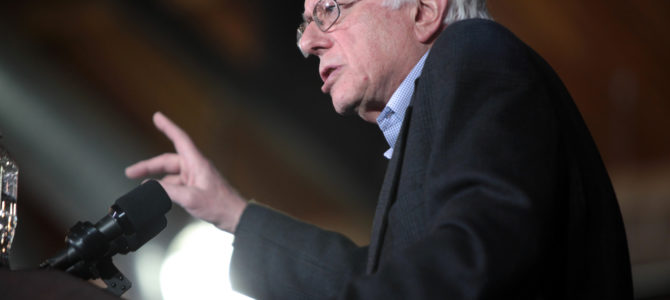
Republicans acknowledged yesterday that their second attempt to repeal and replace the Affordable Care Act has failed. This news comes as those seeking coverage on the Obamacare exchanges prepare for the upcoming open-enrollment period, set to run from November 1 to December 15. There, insurance shoppers will face another year of steep increases: from a 16 percent increase in Michigan, to as much as a 76 percent increase in Oklahoma.
In light of these developments, Sen. Bernie Sanders’s evergreen proposals—“Medicare For All,” and lowering the cost of prescription drug prices by requiring “Medicare to use its bargaining power to negotiate with the prescription drug companies for better prices”—will likely hit front pages and television screens again soon.
However, should Sanders push for “Medicare For All” legislation, he will likely find the public’s support to be fleeting. As a recently released poll by Politico and the Harvard T.H. Chan School of Public demonstrates, support for Medicare for All flows from the public’s unquestioning acceptance of soundbites and branding—not support for another extreme revamping of the American health care system.
It’s All About The Rhetoric
In the September 2017 survey, pollsters asked respondents if they would “favor or oppose replacing the current health insurance system in the United States with a taxpayer-funded national plan like Medicare, which would cover all Americans?” When framed this way, 66 percent of respondents—including 44 percent of Republicans, 80 percent of Democrats, and 67 percent of Independents—favored the proposal.

But when asked whether they would support a “single-payer system,” only a plurality favored that approach.

The poll showed a similar disparity in results when respondents were questioned on the government’s negotiation of Medicare drug prices. When asked about drug pricing proposals—the number one domestic policy concern, according to the survey—pollsters reported that “an overwhelming percentage of the public (88 percent) favors the federal government negotiating with pharmaceutical companies to lower the prices of prescription drugs for seniors on Medicare.”
But when asked whether they still supported this proposition “if it meant that because of these government-negotiated lower prices some pharmaceutical companies might choose to not sell certain prescription drugs to seniors through Medicare,” the number plummeted to 38 percent.
That 38 percent support figure would likely fall even further if the pollsters asked respondents if they would support negotiation of Medicare drug prices “if it meant that the government were to limit the number of drugs available to seniors.” As I explained in detail in “Negotiating Better Medicare Drug Prices Only Happens by Limiting Seniors’ Options,” the only way the government can obtain the kind of cost-savings often touted by politicians is if they reduce the number of covered drugs by as much as 34 percent.
Americans Won’t Like the Details of ‘Medicare For All’
Likewise, even if Sanders continues to market his single-payer health care proposal as “Medicare for All,” when the public learns the details of his plan, they’ll discover that, while the socialist from Vermont is promising puppies and rainbows, he’d be delivering the rationing, limited choice, and poor outcomes of Medicaid—not Medicare. And Medicaid for All lacks the same cachet on which Sanders’ relies in branding his proposal.
While Sanders’ plan seems destined to fail, the Republicans’ second botched attempt to repeal and replace Obamacare has left an opening for Chuck Schumer to instead push for a fix to prop up the Affordable Care Act. Whether the New York Senator can succeed where others have failed remains to be seen. But he has two pluses on his side: an incredible PR team working hand-in-glove with Jimmy Kimmel to market any forthcoming plan to the public, and a cozy game of footsies with Senator McCain on the side, the latter of which may be enough to peel off a sufficient number of Republican votes to make a gang-of legislative-fix possible.
The one downside to Schumer’s approach? He failed to consider the strained relationship between McCain and President Trump. And in lobbying McCain to vote against Graham-Cassidy by promising him “that soon as repeal is off the table, we Democrats are intent on resuming the bipartisan process,” Schumer may have ended up sabotaging his own equally-as-cozy relationship with President Trump. If so, pulling a few Republican votes to the Left won’t be enough to override a presidential veto.









